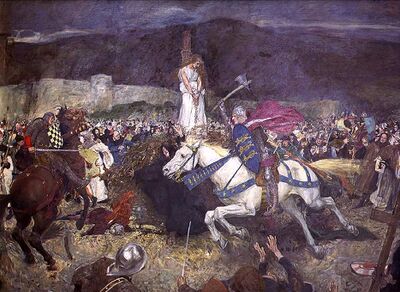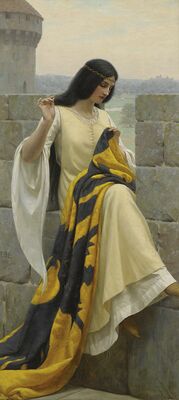Female sex favoritism
Female sex favoritism, sometimes known as chivalry, gynocentrism, or the knightly treatment of women, has a long and storied past.
Female sex favoritism has arguably always existed across most (though definitely not all) cultures as evidenced e.g. by women's higher historical reproductive success, however this article tracks the particular strand that we recognize in the West today.
Possible evolutionary basis[edit | edit source]
As a result of their greater parental investment, women have socially, and by epigenetic theory evolved to be choosy and passive maters. The mathematical fact that in ordinary gender distributions of roughly half male, half female by birth (not modified by external events) that there will be far more fertile men than there are women in their prime fertility years, plus men seek to monopolize women early on to be certain about their paternity. For these reasons, women, especially young women are naturally the highest goal men compete for and hence there is a natural tendency for women to be treated as special and to be put on a pedestal.
The amount of resources human males provide is also extraordinary compared to most animals and unique among primates, with men providing twice as many calories in hunter-gatherer societies than women, and exclusively providing the more nutrient dense meat from hunting, which in turn increases mating opportunities and invests greater nutrition into their mate and offspring, furthering future mating success in subsequent generations.[1][2][3] The importance of resources to women is apparent even in egalitarian societies such as the Ache and the Sharanahua, where the best hunters are able to attract the most sexual partners.[4]
For these reasons, most men may naturally have a drive and willingness to care for women, much like they care for children. This drive could also explain why sex favoritism has emerges in many cultures and why women are more childlike.
The extent to which this is actually done is however, is largely determined by culture. For example, many religions regard women as inferior and hide them from the public, possibly largely also as a means of paternity assurance.
History[edit | edit source]
Birth - Late French Middle-Ages[edit | edit source]
What we know now as unequal chivalry, sometimes called gynocentrism or white knight behavior, arguably only began on a societal scale in the West in 1102AD in France.
War fought in the name of women[edit | edit source]
William IX, the Duke of Aquitaine (Southern France) and the first known Troubadour poet, famously transformed the image of war from something fought for men and God to being fought for women. He famously painted his mistress on his shield (which he called "my lord"). He also famously said that men should sacrifice themselves to women for having birthed them, saying
"It was his will to bear her in battle, as she had borne him in bed"
—William IX
This all occurred in the 12th century, which was in the high middle ages (medieval), after the Dark Ages (early medieval period) and before the Renaissance. Christian humanism was starting to be developed during this time. William was excommunicated twice by the Church. The influence of William IX was felt later through the Troubador poetry tradition he started, as well as his ancestors.
Female-comprised love-courts[edit | edit source]
William's granddaughter, Queen Eleanor (the Duchess of Aquitaine; queen of France and later England ) was, as the regnant duchess of Aquitaine, likely the wealthiest and most powerful woman in Europe.[5] She set up imperial courts with help from her daughter, Marie, comprised solely of ladies to judge over matters of love-disputes. These were called the Courts of Love, modeled after feudal law courts of the period.
12th century - Poetry, satire, and stories[edit | edit source]
Woman-as-ruler in Troubadour Poetry[edit | edit source]
We see the first major female-sex-favoritism in the 'Troubador poetry of the 12th century', as well as vernacular narratives directed toward William's daughter Eleanor. The depictions of love in these poems and narratives are described as "courtly love". It is called this because the man's romantic role is modeled after a knight, and the female's role is modeled after a Lord. In other words, the woman is in complete control of the relationship and the man is ultimately obedient and submissive to the woman. He is expected to "perform great deeds" in order to "earn" her love, a trope still strongly evident today. It is important to note, that this love was only about love outside marriage.[6]
Marie and satire[edit | edit source]
Marie directs her chaplain Andreas Capellanus (André The Chaplain) to write, "The Art of Courtly Love", which, while initially viewed by scholars as a serious text of medieval chivalry, has come to be largely viewed as a parody,[7] warning young men of the true nature of established, fairly neutral chivalric codes.[8] Andreas painted peasants as fornicating beasts that are incapable of love, and recommends that a knight who falls in love with a peasant woman should lure her to a quiet place with honeyed words and "[should] not hesitate to take what you want by force."[9] After extolling some of the virtues of love, the book concludes with Andreas ultimately advising men to forgo love for religious and health reasons and apparently ends with a "misogynistic tirade" against women.
Male submissiveness as "rape prevention"[edit | edit source]
Many historians, such as Eric Köhler and Georges Duby suggested the female-sex-favoritism of love outside marriage was designed that way to keep unmarried men from raping. In other words, gynocentrism was possibly seen in the 12th century as preventing the kind of raping and pillaging that was carried out by the knight in the "Wife of Bath' Tale" one of Chaucer's Canterbury Tales.[10] The "Wife of Bath' Tale" is also notable for arguably having a gynocentric and proto-feminist theme, with the knight in the tale being forced (as penance for his pillaging) to go on quest to find out what it is that women most desire. This quest concludes with the knight learning the ultimate answer to this question is "sovereignty over their husbands". The eponymous Wife of Bath also stridently argues against the supposed "double standard" in regards to female promiscuity.
Stories[edit | edit source]
According to Jennifer Wollock, an author on chivalry, chivalrous love stories became popular in the late Middle Ages, and showed particularly through the contents of women's libraries.
14th century - Beginning of the "Gentle man"[edit | edit source]
In the 14th century, the chivalric concept of a "Gentleman", first appeared.
15th century - Querelle des Femmes[edit | edit source]
The fifteenth century saw a proto-feminist movement called the, "Querelle des Femmes", which was a debate about, among other things, increasing the power of women in society. It technically began in the 12th century through the publication, "Romance of the Rose", but it started as something recognizable today in the 15th century through Christine de Pizan. Thus, Pizan is often seen as the first mover of what we know today as feminism. She promoted ideas of women being smarter, more understanding, peaceful, and more temperamental than men.
“Just as women's bodies are softer than men's, so their understanding is sharper.”
—Christine de Pizan
"Woman by nature is more gentle and circumspect. Therefore, if she has sufficient will and wisdom she can provide the best possible means to pacify man"
—Christine de Pizan
"[I]f you seek in every way to minimise my firm beliefs by your anti-feminist attacks, please recall that a small dagger or knife point can pierce a great, bulging sack and that a small fly can attack a great lion and speedily put him to flight.”
—Christine de Pizan
16th Century - female-sex-favoritism moves into the peasantry[edit | edit source]
The storied model of a man as a knight (submissive) and woman as Lord (ruling) portrayed in Troubador poetry, plays, and stories, is thought to have had an influence on the actual behaviour of later peasantry. 16th century poet and feminist Lucrezia Marinella celebrated the female-sex-favoritism she saw in the Italian lower-classes.
"It is a marvelous sight in our city to see the wife of a shoemaker or butcher or even a porter all dressed up in gold chains around her neck, with pearls and valuable rings around her fingers [...] and then by contrast to see her husband cutting up meat all soiled with ox's blood and down at the heel, or loaded up like a beast of burden dressed in rough cloth, as porters are. At first it may seem an astonishing anomaly to see the wife dressed like a lady and the husband so basely that he often appears to be her servant or butler, but if we consider the matter properly, even if she is humble and low, to be ornamented in this way because of her natural dignity and excellence, and the man less so, like a servant or beast born to serve her."
—Lucrezia Marinella
See also[edit | edit source]
References[edit | edit source]
- ↑ https://www.sciencedirect.com/science/article/pii/S016748701630277X
- ↑ https://www.sciencedirect.com/science/article/abs/pii/S1090513810000279
- ↑ https://incels.wiki/w/Scientific_Blackpill_(Supplemental)#In_hunter-gatherers.2C_men_use_meat_to_obtain_mating_opportunities_and_to_invest_in_mates_and_offspring
- ↑ https://pdfs.semanticscholar.org/bbf7/77fbe21100d32ebd55a41b65de7151628235.pdf (Cashdan 1996)
- ↑ https://en.wikisource.org/wiki/1911_Encyclop%C3%A6dia_Britannica/Eleanor_of_Aquitaine
- ↑ http://cola.calpoly.edu/~dschwart/engl513/courtly/courtly.htm
- ↑ http://cola.calpoly.edu/~dschwart/engl513/courtly/courtly.htm
- ↑ https://en.wikipedia.org/wiki/Andreas_Capellanus
- ↑ http://www.people.fas.harvard.edu/~chaucer/special/authors/andreas/de_amore.html
- ↑ https://en.wikipedia.org/wiki/The_Wife_of_Bath%27s_Tale#Synopsis
{B}}


